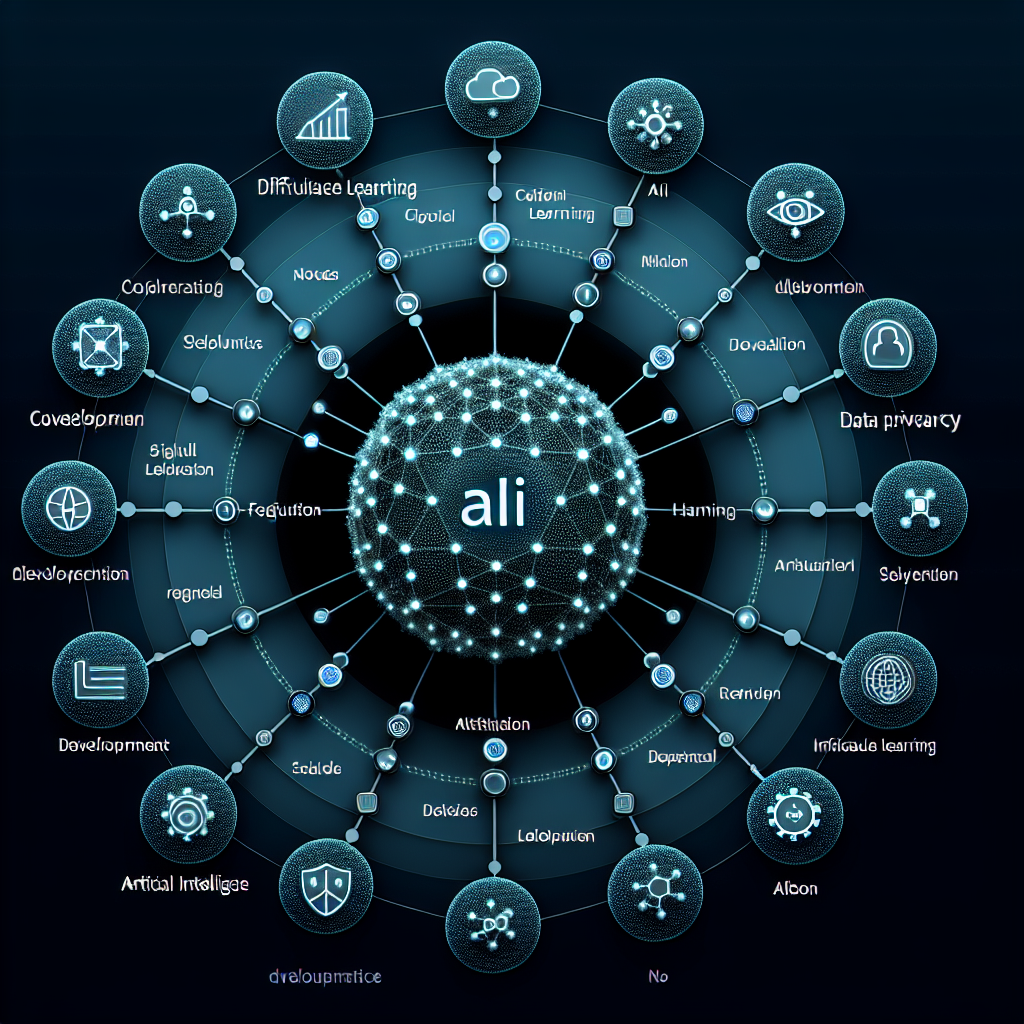Federated learning is a decentralized machine learning approach that enables multiple parties to collaboratively build a global model without sharing their data. This innovative technique has the potential to revolutionize the field of artificial intelligence (AI) development by addressing privacy concerns, reducing computation costs, and improving model performance. In this article, we will explore the influence of federated learning on AI development and its implications for various industries.
Federated learning works by training a global model on local data stored on individual devices, such as smartphones or IoT devices. Instead of sending data to a central server for training, the model is trained locally on each device, and only the model updates are sent back to the central server for aggregation. This approach enables data privacy as the raw data never leaves the device, and only model updates are shared between devices and the central server.
One of the key benefits of federated learning is its ability to address privacy concerns associated with centralized machine learning approaches. In traditional machine learning, data is often collected and stored in a central server, raising concerns about data privacy and security. With federated learning, data remains on the device, reducing the risk of data breaches and ensuring user privacy. This makes federated learning particularly well-suited for applications that involve sensitive or personal data, such as healthcare or finance.
Another advantage of federated learning is its ability to reduce computation costs and improve scalability. Centralized machine learning approaches require large amounts of data to be transferred to a central server for training, which can be time-consuming and resource-intensive. Federated learning, on the other hand, distributes the training process across multiple devices, reducing the need for large-scale data transfer and lowering computation costs. This makes federated learning more efficient and scalable, particularly for applications that require real-time updates or operate on a large scale.
Federated learning also has the potential to improve model performance by leveraging diverse data sources. By training a global model on data from multiple devices, federated learning can capture a more comprehensive and diverse set of features, leading to better generalization and performance. This is particularly beneficial in scenarios where data is distributed across multiple locations or devices, such as edge computing or IoT applications.
The influence of federated learning on AI development extends beyond privacy, scalability, and performance benefits. Federated learning has the potential to enable new applications and use cases that were previously not possible with centralized machine learning approaches. For example, federated learning can be used to train personalized models on individual devices, such as smartphones, to provide personalized recommendations or predictions without compromising user privacy.
In the healthcare industry, federated learning can be used to train models on patient data stored on individual devices, such as wearables or medical devices, to improve diagnostic accuracy or predict patient outcomes. This approach enables healthcare providers to leverage the collective knowledge of multiple devices while preserving patient privacy and confidentiality.
In the financial industry, federated learning can be used to train fraud detection models on transaction data stored on individual devices, such as credit cards or bank accounts, to detect fraudulent activities in real-time. This approach enables financial institutions to collaborate on fraud detection without sharing sensitive customer data, improving security and compliance.
In the retail industry, federated learning can be used to train recommendation models on customer data stored on individual devices, such as smartphones or e-commerce platforms, to provide personalized product recommendations or marketing campaigns. This approach enables retailers to deliver personalized experiences to customers while protecting their privacy and data security.
Overall, the influence of federated learning on AI development is significant, with the potential to drive innovation and transformation across various industries. By addressing privacy concerns, reducing computation costs, improving model performance, and enabling new applications and use cases, federated learning is shaping the future of AI development and unlocking new opportunities for collaboration and growth.
Frequently Asked Questions (FAQs):
Q: How does federated learning ensure data privacy?
A: Federated learning ensures data privacy by keeping data on individual devices and only sharing model updates between devices and the central server. This approach reduces the risk of data breaches and ensures user privacy.
Q: What are the benefits of federated learning over centralized machine learning?
A: Federated learning offers several benefits over centralized machine learning, including improved data privacy, reduced computation costs, better scalability, and enhanced model performance.
Q: In which industries is federated learning being used?
A: Federated learning is being used in various industries, including healthcare, finance, retail, and more, to address privacy concerns, improve model performance, and enable new applications and use cases.
Q: How can federated learning be implemented in practice?
A: Federated learning can be implemented by deploying a central server that coordinates model training across multiple devices and aggregating model updates to build a global model. This approach enables collaborative training without sharing raw data.
Q: What are the challenges of federated learning?
A: Some of the challenges of federated learning include communication overhead, heterogeneity of data sources, and coordination of model updates. These challenges can be addressed through optimization techniques and algorithmic improvements.
In conclusion, federated learning is a game-changing approach to machine learning that is transforming the field of artificial intelligence development. By addressing privacy concerns, reducing computation costs, improving model performance, and enabling new applications and use cases, federated learning is driving innovation and unlocking new opportunities for collaboration and growth across various industries. The influence of federated learning on AI development is significant, and its potential to shape the future of machine learning is undeniable.

